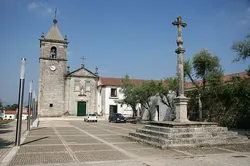

Braga-Celorico de Basto: History and Features
Explore Braga and Celorico de Basto's rich history and unique features. Discover why these charming places in Portugal are worth a visit.
Exploring Celorico de Basto, Braga
Mycarro AI
May 2, 2025
Introduction to Celorico de Basto
Celorico de Basto is a charming municipality located in the Braga District of Portugal. Nestled between the majestic mountains of Serra do Marão and Serra do Alvão, it offers a respite from the hustle and bustle of urban life while providing breathtaking natural scenery. This small town is rich in history, culture, and traditions that reflect the essence of Portuguese heritage, making it a worthy destination for travelers looking to immerse themselves in the beauty of rural Portugal.
Historical Significance
The history of Celorico de Basto dates back centuries, with traces of human settlement found as far back as the Paleolithic era. However, the town's recorded history began in the 11th century, when it became a prominent center during the Christian reconquest of the Iberian Peninsula. Over the years, it evolved into a strategic location, serving as a junction for trade routes and hosting numerous historical events that have shaped its culture.
One of the most significant monuments is the Church of Santa Maria de Airão, which exemplifies Romanesque architecture and showcases the town’s ecclesiastical history. Visitors can also explore the medieval castle ruins, which offer panoramic views of the surrounding landscape and a glimpse into the past.
Natural Beauty and Outdoor Activities
Celorico de Basto is surrounded by lush green forests, rolling hills, and the crystal-clear waters of the River Olo. This natural environment is a haven for outdoor enthusiasts, offering a wide range of activities such as hiking, mountain biking, and fishing. The picturesque landscape invites both adventure seekers and those simply looking to relax and enjoy the serene ambiance.
For those interested in hiking, the numerous trails in the area, such as the “Rota do Marão,” provide stunning views of the valleys and mountain ranges. Each path leads to unique spots where one can appreciate the beauty and tranquility that nature offers.
Local Culture and Traditions
The culture of Celorico de Basto is deeply rooted in tradition, with festivals and events that celebrate its rich heritage. One of the most popular events is the "Festa de São Sebastião," held annually in January, which draws locals and visitors alike. This festival includes processions, folk music, and traditional dances, creating a vibrant atmosphere that showcases the community's spirit.
The town is also known for its artisanal crafts, particularly pottery and weaving. Local artisans produce exquisite handmade goods, providing visitors with the opportunity to take home a piece of Celorico’s unique heritage.
Gastronomic Delights
Gastronomy is another highlight of Celorico de Basto. The region is renowned for its traditional Portuguese cuisine, characterized by hearty dishes and local ingredients. One must-try dish is "Bacalhau à Brás," a codfish recipe, along with the famous "Pão de Ló," a light sponge cake that is a staple in Portuguese celebrations.
Many local restaurants offer these culinary delights, where diners can enjoy authentic recipes passed down through generations. Wine enthusiasts will also find the region’s wines, especially those from the nearby Vinho Verde appellation, to be a refreshing accompaniment to the delectable meals.
Accessibility and Connectivity
Celorico de Basto is conveniently situated, with easy access from major cities such as Porto and Braga. The municipality is well-connected by road, making it an ideal stop for those exploring the northern part of Portugal. Public transportation options are available, though having a car is recommended for those looking to discover the more remote and beautiful spots in the surrounding area.
Conclusion
Celorico de Basto may be a small town, but its blend of history, culture, natural beauty, and culinary experiences make it a hidden gem in Portugal. Whether you are seeking adventure in nature, a taste of local traditions, or simply a peaceful getaway, Celorico de Basto offers something for everyone. As this enchanting municipality continues to attract visitors from around the world, it remains a testament to the rich tapestry of Portuguese life and heritage.